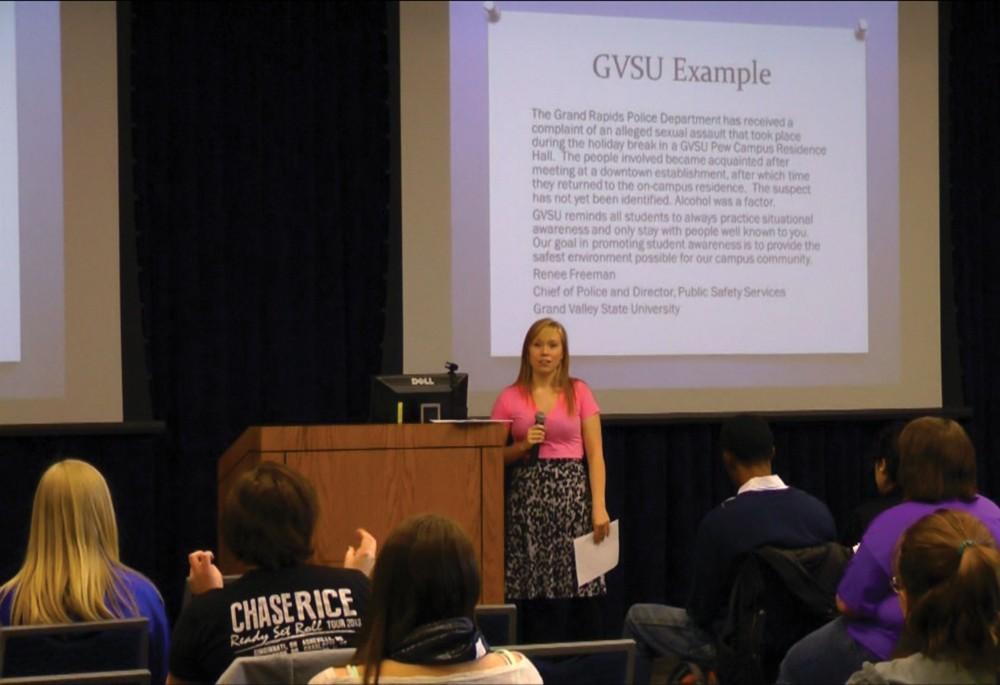Student questions GVPD protocol

Courtesy / Police Chief Renee Freeman interrupts a student’s presentation about blaming rape victims during the Teach-In during the last week of March.
Apr 9, 2014
Earlier this year on Jan. 8, students were notified of a sexual assault that took place on Grand Valley State University’s Pew Campus in an email from the GVSU Police Department. This email later became a topic of conversation at the March 26 Teach-In between a student presenter and the officer who penned it.
The Teach-In session, “The Power of Language in Campus Rape Culture,” led by GVSU junior Megan Prangley, expanded on the power of language and its effect on college rape culture. The concept attributes the idea of rape and sexual assault to being a part of a society that teaches how to avoid being raped rather than condemning the act, itself.
Prangley cited the email in her presentation to illustrate a GVSU-specific example as well as showcase language that she found to be problematic, saying that it placed fault on the victim.
The email Prangley referenced reads, “The Grand Rapids Police Department has received a complaint of an alleged sexual assault that took place during the holiday break in a GVSU Pew Campus Residence Hall. The people involved became acquainted after meeting at a downtown establishment, after which time they returned to the on-campus residence. The suspect has not yet been identified. Alcohol was a factor. GVSU reminds all students to always practice situational awareness and only stay with people well known to you. Our goal in promoting student awareness is to provide the safest environment possible for our campus community.”
Chief of Police Renee Freeman, who authored the email, was present during the Teach-In session and openly shared her reasoning behind the tone and language she used in the notification.
Freeman publicly stated, “I have to stay neutral, and I have a job to do. This email was meant to say, ‘Hey this happened, and please be mindful so it doesn’t happen to you.’”
Prangley had several complaints about the wording of the message, though.
“The email used language such as ‘alleged’ and that it was a ‘complaint.’ (Freeman) said it’s protocol. Since it is indeed protocol, then the protocol is wrong,” Prangley said. “It already assumes that rape is something that didn’t happen, and it adds doubt and mistreats the victims. (Police) say alcohol needs to be said, but alcohol is not a factor, it’s a tool, and the language perpetuates the stereotype that girls get raped because they’re drunk.”
During the Teach-In, Freeman also expounded some of the lines Prangley used as examples of victim blaming.
“We received a complaint. That’s what the police call it, a complaint report,” Freeman said. “Perhaps we should have used ‘report’ instead, and I will be mindful of that next time. We received a report of an alleged sexual assault because that’s what it is. We cannot convict anyone until it has gone through, so we can’t say it happened. Even if in my heart I think it happened, I can’t take a side. I must remain neutral.”
Captain Brandon DeHaan, assistant director of the Department of Public Safety at GVSU, said the email was a “timely warning,” a notice that is triggered as soon as there is pertinent information that alerts the campus community of a continuing or immediate threat.
DeHaan also said the police department was operating within its responsibilities under the Clery Act, a federal law that requires colleges and universities receiving federal funding to annually publish crime statistics for certain criminal offenses reported to local law enforcement.
“The university believes there’s an obligation that our federal staff, faculty and students are aware of the dangers that are out there. If there’s a crime, we relay that information to our community if it meets the criteria for a timely warning notice,” he said. “A timely warning notice is if there’s a continuing or ongoing threat to the campus community and is an incident of criminal homicide, aggravated assault, robbery, sexual assault or other major crimes deemed necessary.”
The “Timely Warning Notice” policy is outlined in the Annual Security and Fire Safety Report and can be found on GVSU’s website. The report states what a timely warning will include, such as the “date and timeframe of the incident, a brief description including where it occurred, and information that will promote safety and potentially aid in the prevention of similar crimes (crime prevention or safety tips).”
While GVPD operates with the objective to keep the campus community safe and functions as a result of federal laws and requirements, Prangley said she feels that this is where the problem lies. Not with GVPD, itself, but in the institutionalized polices society is conditioned to.
“It’s bigger than any one person,” Prangley said. “(Freeman) was doing her job, and she gets it from our laws. But what our laws teach us is wrong, which is victim blaming. It’s something that’s built into our institutions, and we need to understand that it’s a problem. She was using what she was supposed to use, and the fact that that is what she’s given, it’s a federal problem. The defense was valid, but it also validated my point the tools she’s working in are wrong, not her.”

























